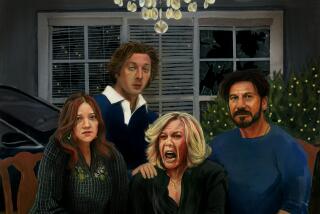STAGE REVIEWS : ‘THE MAN’ WORKS WONDERS AT ‘DINNER’
- Share via
The key to staging an appetizing “The Man Who Came to Dinner” isn’t much of a secret: Bring in an actor who can make “the man” a provocative stage presence, an alloy of obnoxious overlord and beguiling brat, and the show is well on its way.
Westminster Community Theatre’s “Dinner” bears this out.
With Charles Taylor as Sheridan Whiteside, the blustery, eccentric radio celebrity who invades the petrified environs of Visalia, Ohio, the potential of Kaufman and Hart’s 1939 comedy is nicely realized.
Taylor dominates the production as completely as Whiteside dominates the conservative Stanley family that is forced to take him in. From the moment this Whiteside rolls into the Stanleys’ living room in a wheelchair, squints critically at the hapless clan and gruffly announces “I may vomit,” he’s taken control and set the wry tone that is kept throughout. A testament to Taylor’s caustic, right-on performance is that the scenes without him (and there aren’t many) slacken, with gags sputtering until he returns and takes charge.
Taylor knows what he’s doing, and director Jan Angelino wisely lets him set much of the timing. As the play is really about Whiteside’s interactions with the other characters, it makes sense to give Taylor a free hand.
Also, Angelino plays it straight with the script. “Dinner” is arguably Kaufman and Hart’s best work, so why jimmy with it? It’s aged well; the tilted 1930s humor still clicks, even in the oh-so-sophisticated ‘80s. The situation is itchingly funny (ever have a house guest you couldn’t get rid of?), and the characters are intriguingly offbeat.
Whiteside’s visiting chums range from fur-draped movie queen Lorraine Sheldon (played as gaudily glamorous by Beth Titus) to Banjo (Jack Schlatter is appropriately silly), a film comedian supposedly modeled after Harpo Marx. There’s also Beverly Carlton (rousingly played by Randy Callahan), a prancing Hollywood hotshot who engineers trouble wherever he goes.
The sets (by Bronsonare OK, but the seediness of some of the living room furniture doesn’t jibe with the Stanleys’ strait-laced prosperity. There are also problems with Roz Abrams’ and Toni Colley’s costumes--many accurately reflect the period but several look too contemporary.
More to Read
The biggest entertainment stories
Get our big stories about Hollywood, film, television, music, arts, culture and more right in your inbox as soon as they publish.
You may occasionally receive promotional content from the Los Angeles Times.










